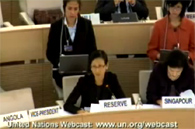On 6 May 2011, Singapore underwent its first-ever Universal Periodic Review (UPR) by the UN Human Rights Council in Geneva – the only universal mechanism that reviews the human rights situation in all 192 UN Member States once every four years. A second hearing has been scheduled for September 2011. At the first hearing, only states have a right to question Singapore while civil societies can do so at the second hearing.

As noted by Fridae's legal columnist in "Will Singapore’s equal rights record withstand United Nations examination?", Singapore's official national report to the United Nations Human Rights Council for the Universal Periodic Review did not mention section 377A of the Singapore Penal Code that criminalises sexual relations between men.
There were a total of 19 submissions, five of these were joint submissions. The number of parties which submitted numbered 27. Of these, 17 were by Singaporean organisations and 11 by international NGOs, like Amnesty International. Of the submissions by Singaporean civil societies, only People Like Us and COSINGO referred to s377A and discrimination of LGBTQ rights. (COSINGO is the acronym for Coalition of Singapore NGOs, spearheaded by MARUAH.)
At the session on May 6, several countries including UK, France and Canada amongst others queried Singapore's continuing criminalisation of male gay sex to which a Singapore delegate Sng Siew Ping, Director (International Relations), Ministry of Home Affairs, responded saying:
"The issue of sexual orientation raised by France and UK, and in advance by Canada, Ireland and the Netherlands. My delegation is aware that sexual orientation is also a controversial issue in UN bodies including the present one.
"In Singapore, people are free to pursue their interests and lifestyles. Recognition and success is based on merit and not on factors such as sexual orientation. In the area of employment, the Tripartite Alliance for Fair Employment Practices promotes and educates employers and the general public on fair and responsible employment practices. Our legislation also allows those who feel that they have been unfairly dismissed including on grounds of sexual orientation to appeal to the Minister for Manpower to be reinstated. Yet we recognise that much of Singapore society remains conservative social mores and mindset cannot be changed by legislation alone. In recent times we had robust parliamentary debates in Singapore on whether to decriminalise certain homosexual acts. On this let me assure the UK and clarify in particular that what is being criminalised is not gay Singaporeans but homosexual acts between men. Now an extensive public consultation was held and the matter was considered at the highest political levels, it was not taken lightly and in the end it was decided to leave things be. The Singapore police has not been proactively enforcing the provision and will continue to take this stance.
"To answer the delegate from Canada, no action is taken against consenting adult males who may have relations unless their conduct breaks other laws, for instance laws against indecent public behaviour or paedophilia. [Editor's note: But how will any relations between 'consenting adult males' ever involve paedophilia?] The reality is that LGBT people in Singapore do not have to hide their sexual orientation for fear of losing their jobs or for fear of prosecution by the state. They have a place in our society and are entitled to their private lives."
Singapore's national report, compilation of UN information, summary of stakeholders' information, questions submitted in advance and soon to be released outcome of the review can be read here (or here, select 'Singapore' under the 'UPR by Country' pull-down menu) .
The Permanent Mission of Singapore, Geneva can be contacted via singpm_gva@sgmfa.gov.sg.
Advance questions to Singapore
Canada: Singapore does not provide protection from discrimination on the basis of sexual orientation and still criminalizes sexual relations between men under Section 377A of the Penal Code which includes a mandatory jail sentence for those convicted. While the Prime Minister has said Article 377A is not “proactively enforced”, what does this mean for homosexual men in practice? Furthermore, what non-discrimination protections, including in the area of employment, are in place for members of the LGBT community?
Ireland: Ireland welcomes the comments of the UN Special Rapporteur on contemporary forms of racism, racial discrimination, xenophobia and related intolerance on the notable peaceful coexistence of the diverse communities in Singapore. Ireland notes that there are some concerns that anti-discrimination laws do not provide adequate protection for: persons encountering discrimination which is not specified in law, the disabled, persons belonging to the Lesbian Gay Bisexual and Transgender community, pregnant women and foreign women married to Singaporean nationals.Has Singapore examined these issues and will it amend current legislation as required to implement protections for these persons in law?
Netherlands: Will Singapore maintain criminal sanctions against sexual activity between consenting adults of the same sex? Does it intend to repeal the relevant legal provisions (ref para 28 of the summary report prepared by the OHCHR in accordance with para 15C.)
Other commonly asked questions pertained to ratifying the human rights treaties to which Singapore is not yet a party, human trafficking, detention without trial, death penalty and corporal punishment, control of the media sector/press freedom, rights of women and establishing an independent electoral commission in line with international standards.
